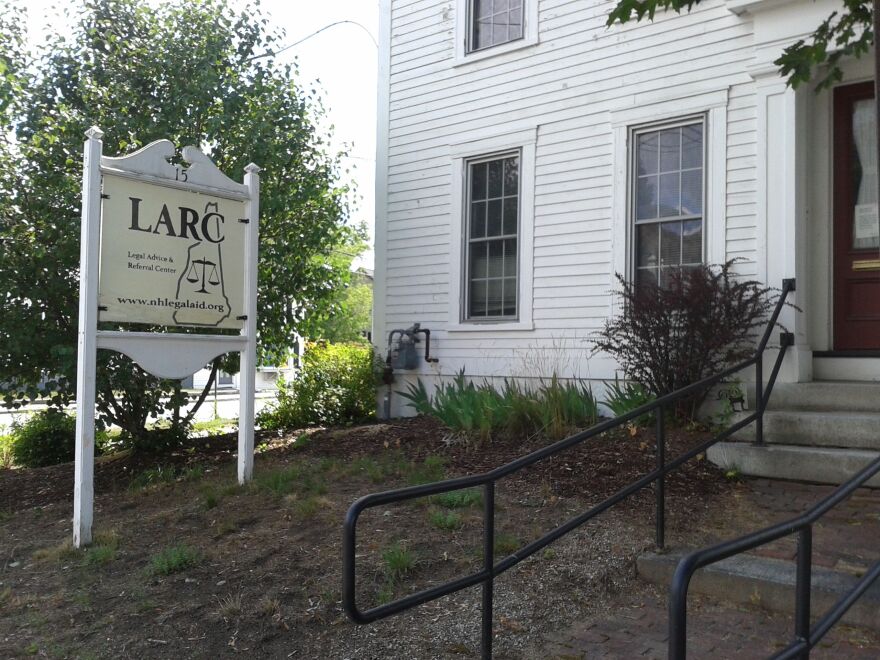New Hampshire's ban on evictions has ended. Gov. Chris Sununu announced back in March that landlords were not allowed to evict tenants during the public health emergency. But as protections for renters expire, many residents are still in danger of losing their homes.
Jeff Goodrich is an attorney with the Legal Advice and Referral Center, which provides legal services for New Hampshire's low-income families.
He's joined NHPR’s Peter Biello to talk about the end of the state's eviction ban.
(Below is a lightly edited transcript of the interview.)
So what's going to happen to renters today whose landlords have been wanting to evict them?
Well, what's going to happen is if the landlord wants to evict the tenant for non-payment of rent, the landlord is going to have to start within eviction notices. Normally, the eviction notice expires in seven days, meaning that the tenant has seven days to come up with the rent or then the next phase, the eviction process takes over. But under the governor's order, all those eviction notices are now extended to 30 days. So the tenant will have an entire month to come up with a rent if they can pay the rent, plus a $15 liquidated damages fee. The landlord cannot proceed with the eviction.
I see. So they have to come up with the entirety of the missed payments, whether it's one month or three.
Yes, they would have to pay the entire amount of the rent that's owed. However, there is help for tenants. The state of New Hampshire has received about $35 million for tenant relief, and that's being administered through the CAP program, the Community Action Programs. And what the tenant would do is they would go to their local CAP office and then apply for assistance there.
And I know it's only been a day, but what about speakers of other languages? To what extent are you concerned about their access to support?
Well, we are. We do try to help the Spanish speaking community, which I believe is the largest English as a second language community in New Hampshire. We do have staff who speak Spanish and we have our site, which also can be read in Spanish. And it's both English and Spanish.
Do you know if $35 million would be enough, given the current crisis, to avoid all the possible evictions for non-payment, assuming, of course, everybody who needed assistance actually applied for it right now?
Nobody knows. I'm hoping that $35 million will make a dent. However, I can't say if that would be enough. I mean, we'll just have to wait and see what happens.
Are you able to tell me about a client you've worked with without using any identifying information who might now have reason to worry now that this moratorium on evictions has expired?
If the client has no financial means at all to pay the back rent and they've accumulated more than twenty five hundred dollars in back rent, they might be in a precarious situation. Obviously, they could get the $2,500 from the CAP program, but if they owe more than that, we would suggest they go to their local welfare office and perhaps they could receive some financial assistance from them as well. But indeed, that would be something that is kind of touch-and-go.
And what's the role of a landlord in this situation if they have a tenant who they might want to start eviction proceedings on? Do you have any advice for landlords thinking of proceeding with evictions?
I guess my thought would be if you can keep the tenant in your apartment, please do so. Otherwise, I would suggest that you try to negotiate with the tenants some type of repayment plan. Obviously, many tenants will not have, you know, one or two or maybe even three months of back rent handy. And they might not be able to get their hands on it overnight, but they may be going back to work or they may have some other form of income rather than just booting them out and then trying to find someone else. If the tenant has otherwise been a good tenant, try to work with the tenant and try to see if there's some type of arrangement you can make with a tenant pays the rent, plus a little bit more towards the back rent.
What if someone's housed in a shelter but is looking for something more permanent? What options do they have?
I would go to the local CAP organization, fill out an application, ask them for assistance in transitioning from a shelter into an apartment.
What about people who live in subsidized housing?
For tenants who live in an apartment that has subsidy or is backed by a federal mortgage, there's the CARES Act that will extend the ... if you fall into one of those categories, the landlord cannot present you with an eviction notice until after July 25th. And the good thing about this is that you don't have to have a subsidy if you live in an apartment building. And one person in that apartment building has a Section 8 voucher or some type of subsidy, you're covered. Also, if the apartment building is backed by a federal insured loan, then you are covered as well by the care.
__________________________
CLARIFICATION: Governor Sununu has ordered eviction notices to be extended for 30 days instead of the typical seven, for any eviction notices due to nonpayment between March 17 and June 11, 2020. According to Jeff Goodrich, staff attorney at the Legal Aid Resource Center, "The tenant will have the entire month to come up with the rent. If they can pay the rent plus a $15 liquidated damages fee the landlord cannot proceed with the eviction."
However, any eviction notice served for unpaid rent that was due after June 11 (including the first of the month for July) falls under the 7-day eviction period.







